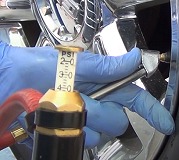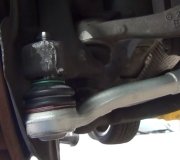32,000 miles isn't all that bad on a set of tires. Be grateful you never owned a 1980's Ford Escort. Every salesman and mechanic knew 15,000 miles was the best you could hope for on the front tires, but they didn't tell you that when you were car shopping.
"Bad now" is a relative term. Is there an unusual wear pattern on any of the tires? If so, have a four-wheel alignment performed. This should be done before replacing the tires so the mechanic can "read" them. It was very frustrating for me when a customer blamed me for not correcting a problem and their second set of tires wore out the same way as the previous set but I never got to see the old tires. We can make small modifications to factory specs to alleviate tire wear from such things as an always-heavily-loaded car to customer-performed modifications to the suspension system but we have to see and feel the old tires to help us decide what alignment angles to change. High mileage and age contribute to worn springs which lower ride height and change alignment settings and the arc the suspension parts travel in as the vehicles goes up and down bumps in the road. When the springs are really weak, there will be excessive tire wear no matter how the alignment is set. Those springs must be replaced. Ford trucks, especially the small ones, are famous for this. Mildly weak springs that aren't bad enough to warrant replacement can still be a contributor to tire wear that can be minimized by altering the alignment settings, but again, we have to see how the old tires were wearing.
If one or two tires developed a broken belt, that doesn't mean the rest are worn out or bad. Goodyear tires used to be noted for developing broken belts when they neared the end of their tread life. Uniroyal tires are just plain noted for broken belts. I don't know which tire company made your tires and you didn't say what the mileage rating is, so the question still remains, what is your definition of "bad"?
6,000 miles for a rotation is overkill if you don't have an alignment issue. If you have a vehicle with design problems that lead to rapid tire wear like the Ford Escort, full-size trucks, mid 90s or older Ranger, and Bronco 2, 6,000 mile rotation intervals will help maintain good tire wear patterns, and all four tires will wear out rapidly at the same rate.
I'm at the other end of the spectrum. I haven't purchased new tires since 1976 for any of my cars. I use old tires customers wanted replaced. I never rotate any tires because every car I own is in perfect alignment. When two tires are worn out, I put on two more used ones. What you should be aware of though is your front tires will wear faster because of the higher vehicle weight, they do the pulling, and they are responsible for 80 percent of the stopping power. If you never rotate your tires, the front pair will wear soonest and you will only have to buy two new ones. The rear tires on a front-wheel-drive minivan will last two to three times longer than the front tires. I always recommend putting the new tires on the front for best traction in snow and decreased chance of hydroplaning in water.
2/32" tread depth is the point at which the tread is considered worn out. When you buy new tires, they all have traction and tread wear ratings. Typically, the harder the rubber compound, the longer they will wear, but the less traction they will have on dry pavement. Ask a few tire salesmen for recommendations. I remember a tire sold in the late 1980s that gave a real smooth, quiet ride, and wore like iron as long as you didn't drive on dirt / granite roads. If you did, they didn't even deliver one fourth of their expected mileage. A good salesman will steer you away from tires with known issues that will affect your type of driving.
Caradiodoc
Wednesday, December 16th, 2009 AT 7:25 AM


